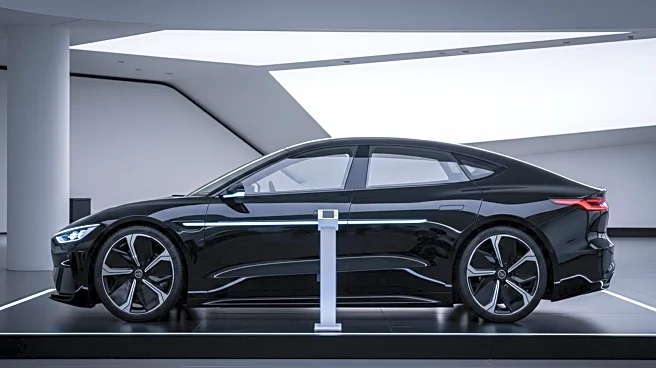What's Happening?
BMW has revealed its upcoming electric 3 Series, the i3, which will be built on the Neue Klasse EV platform. This marks a significant shift from the original i3 city car to a more robust electric sedan. The i3 will feature BMW's first 800-volt architecture, offering up to 400 miles of range and rapid charging capabilities. The vehicle will include a widescreen display and a dash-mounted touchscreen running BMW's new Operating System X. The i3 is expected to have a less-powerful, single-motor variant alongside a more powerful version. BMW plans to launch 40 new or updated models by 2027, indicating a busy period for the company.
Why It's Important?
BMW's introduction of the electric i3 signifies a major advancement in the company's electric vehicle strategy, aligning with global trends towards sustainable transportation. The Neue Klasse platform's high-voltage architecture and rapid charging capabilities position BMW competitively in the EV market, potentially influencing industry standards. The i3's design and technology reflect BMW's commitment to innovation, which could attract environmentally conscious consumers and drive sales. As the automotive industry shifts towards electrification, BMW's strategic moves may impact market dynamics, encouraging other manufacturers to accelerate their own electric vehicle development.
What's Next?
BMW plans to continue expanding its electric vehicle lineup, with the i3 set to launch next year. The company will also introduce an M variant of the i3, while maintaining production of gas-powered models. BMW's strategy includes launching 40 new or updated models by 2027, suggesting ongoing investment in both electric and traditional vehicles. As BMW rolls out these models, the company will likely focus on enhancing its EV technology and infrastructure to support increased demand. Stakeholders, including consumers, competitors, and policymakers, will be watching BMW's progress closely as the company navigates the challenges and opportunities of the evolving automotive landscape.
Beyond the Headlines
BMW's shift towards electrification raises broader questions about the future of automotive design and manufacturing. The integration of advanced technology in the i3 reflects a trend towards more connected and intelligent vehicles, which could redefine consumer expectations and driving experiences. As electric vehicles become more prevalent, issues such as battery production, resource sustainability, and environmental impact will become increasingly important. BMW's approach to balancing electric and gas-powered models highlights the complexities of transitioning to a fully electric future, prompting discussions about the role of traditional vehicles in a rapidly changing industry.









